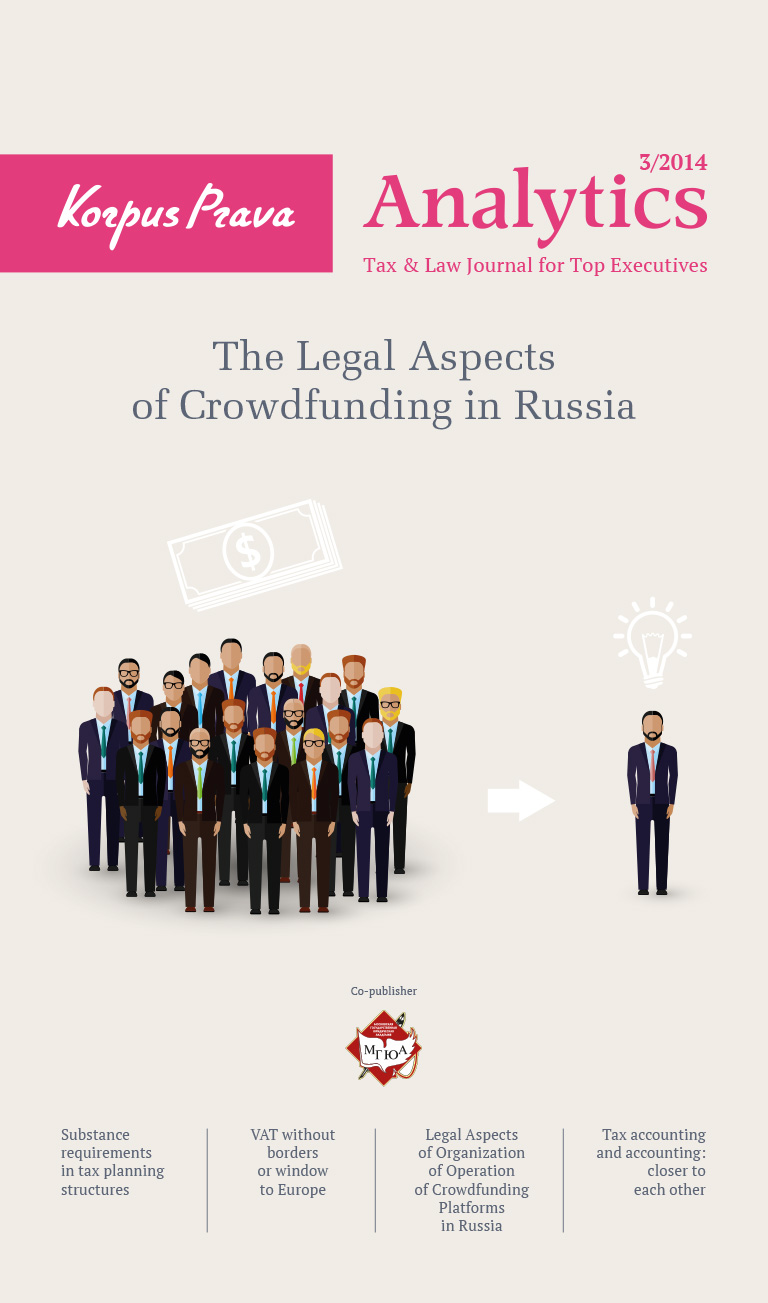- Cyprus Citizenship Scheme for Foreign Investors
- Squeezed But Pleased: Taxation of Passive Income in the European Union
- VAT Without Borders or Window to Europe
- Legal Aspects of Organization of Operation of Crowdfunding Platforms in Russia
- Substance Requirements in Tax Planning Structures
- “Deposit Splitting” of Individuals. Legal Civil and Criminal Aspects
Are Banks and Businesses Still Friends?
When planning a business, each entrepreneur tries to work out an effective and quick way to set it up and envisage all the difficulties. After the registration of the company, the founder faces the problem of settling payments with counterparties, partners, tax and other state authorities. As a rule, this problem is solved by opening a bank account.
A few years ago, the procedure of opening a bank account for business was not unusual and was not associated with any complex procedures. Relations between businesses and banks were based on trustworthy partnership, but in recent years the world has changed a lot.
Introduction of Anti-Money Laundering and Counter-Terrorist Financing (AML/CTF) legislation in various countries worldwide made significant changes to the situation. Earlier, in previous “Analytics” editions we already covered specific regulatory requirements of this legislation in different jurisdictions. It should be noted that the issue of money-laundering and terrorist financing is not just an internal state reference point of financial security. The international community has set general rules for monitoring compliance with AML/CTF legislation; therefore, procedures performed by banks under this legislation in different jurisdictions are generally quite similar.
One of the major international organizations in the field of anti-money laundering and counter-terrorist financing is the Financial Action Task Force (FATF). The aim of this task force is to develop recommendations in the field of AML/CTF legislation. These recommendations are mandatory for implementation in international and local legislation and are reflected in such existing legal acts as the so-called AML 4 (European Union Directive No. 2015/849 dated 20.05.2015) aimed at combating money laundering; local legal acts of the member states of the European Union, as well as many others. References to FATF recommendations may even be found in tax regulation, namely Common Reporting Standard. Updated instructions are regularly issued for the financial sector, providing information on the methods that should be used to audit clients based on risk assessment. Measures to control activities of clients are applied depending on the assignment of a client to a particular risk group. This approach is called risk-based approach. Risk assessment should help companies to understand the way they are exposed to the risk of money laundering. Financial institutions should identify and assess risks under AML/CFM legislation related to products and services provided by the client companies, to jurisdictions in which such companies operate, to clients such companies attract, and to transaction or delivery channels that such companies use to render services to their clients.
Banks, as well as other financial institutions worldwide, have to comply with the anti-money laundering and counter-terrorist financing legislation, therefore, when opening an account for the client’s company, they have to follow a number of procedures and make requests for a certain amount of information. Let us take a closer look at what requirements and requests from banks clients face when opening an account for their business.
Having collected the required information,
the bank assigns a certain level of risk to the client
Measures taken to identify and assess risks under AML/CTF legislation should be proportional to the nature of the business and the size of the company. When opening a bank account, the bank will require the client to provide highly detailed information about the current or planned activities of the company, its structure, estimated operations, and will ask to fill in some relevant bank forms with a large number of questions. In addition, the bank will ask to disclose the beneficial owner of the company and full information on him/her by submitting a number of documents, for example:
- Identification documents (passport/another ID);
- Documents confirming the residence address (utility bill/bank statement);
- CV containing detailed information on employment;
- Information on sources of income and wealth.
The bank may also request additional documents. Such documents may include:
- Documents confirming the source and amount of income (for example, in the form of certificate 3 — Personal Income Tax (NDFL) for Russian citizens);
- Letters of recommendation from other banks, audit or law firms verifying good reputation;
- Documents confirming ownership of real estate;
- Other documents deemed necessary by the bank.
Having collected the required information, the bank assigns a certain level of risk to the client. The assignment of a client into a particular group is based on the background of the client, the type and nature of their business, the country of origin, the services and financial instruments for which applications are made, the estimated level and nature of commercial transactions, as well as the expected source and origin of funds. Thus, clients are classified into the following groups: low, normal and high risks.
The following companies may be classified as high-risk companies:
- Companies with a complex structure of affiliated and related persons;
- Companies registered in offshore centres;
- Companies with Politically Exposed Persons (PEPs) as their beneficiaries;
- Companies interacting with counterparties involved in transactions that include significant amounts of cash;
- Companies registered/incorporated in one of the high-risk countries or countries are known for high levels of corruption, organized crime or drug trafficking.
The above list is not a complete list of criteria by which companies may be classified as high-risk companies. This list is extended with each amendment to the AML/CTF legislation.
After grouping clients into risk groups, sufficient control measures for each group are determined. General control measures include monitoring suspicious transactions, maintaining lists containing clients’ names, account numbers and the date of commencement of business relations, etc. The bank shall regularly report to the regulatory body on compliance with the AML/CTF legislation.
Furthermore, the bank will ask the client to fill in forms as part of the U.S. Financial Account Tax Compliance Act (FATCA) and Common Reporting Standard (CRS). The information received from the client after filling in such forms will be sent to the tax authorities for tax reporting. It should be noted that such reporting will take place only between the countries that have signed the relevant agreements, but there are practically no states left worldwide that have not done so.
Therefore, on the one hand, the opening of a bank account, as well as its further maintenance is a regulated procedure that takes some time and requires clients to disclose maximum information about themselves and the company. That is the current state of things. On the other hand, competent business structuring and compliance with international recommendations will allow clients and their companies to feel confident in the market when settling payments with counterparties. The client may always contact qualified experts for assistance in developing a competent and effective business scheme, as well as for the company support when opening a bank account.
Your subscription to our journal will definitely boost the efficiency of your specialists and downsize your expenses for consultants.
The journal is available free of charge in the electronic version.
Free Download

